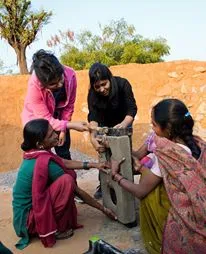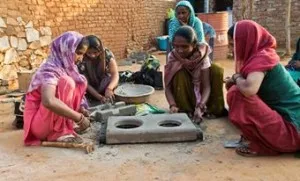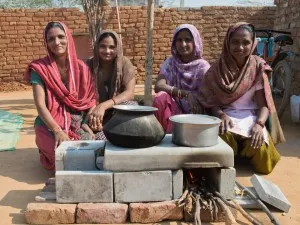Enactus IIT Delhi takes an initiative for combating indoor air pollution in poor households
Cooking is an act of love and this shouldn’t kill people. But if you knew how food is cooked by 22000-plus members of the Odh community, you would have second thoughts. They cook food on traditional stoves fuelled by firewood that produce a lot of harmful and poisonous smoke like carbon monoxide, and as a result a large group of members from the community have been crippled with lung diseases. The worst affected among them are women and children.

It was knowledge about this community that spurred a bunch of students from IIT Delhi to start Project Aanch. The group, Enactus IIT Delhi, is a part of a non-profit international organization Enactus. Enactus aims to mobilize university students to make a difference in their communities and become socially responsible business leaders. Since starting in July 2010 it has now grown into one of the most dynamic student initiatives, Project Aanch is the latest project they are working on at present.
This team analyzed the Odh problem closely and realized that the scale of problem was huge and there was no available solution to change the situation those people were in. They also found out that indoor air pollution is among the leading causes of death in poor households all over the world. The sheer magnitude of impact that they could make if they executed the project well, led this enthusiastic bunch to work on this tough but possible project. After much brainstorming the innovative idea that the Enactus team came up was of smokeless stoves based on a design by Philips.
Project Aanch also focuses on creating five women entrepreneurs who will become financially independent on the successful completion of the project, and can lead the actual business of producing these smokeless stoves and distributing them within the community.
The team has released their product in the Odh community staying at Bhatti Mines and are working toward further improving their product design from customer feedback. They also conducted a mass publicity campaign in the area recently to explain to the community the dangers of the existent product and how the smokeless stove solves the problem.After the pilot, they plan to collaborate with NGOs and other organizations to expand it to other communities where there are similar needs. “Once we are able to understand the needs of rural customers well, it would become easy for us to expand rapidly,” says an Enactus team member.

As one of the core principles of the Enactus model is that the students are not beneficiaries of any revenue that is generated by the project. It is the entrepreneurs working within the community who will benefit from it -- in this case the 5 women entrepreneurs who will be the owners of the project. Currently, a women can easily earn Rs 500 Rupees from eight hours of work through the project.

The project made the Enactus team realize that though poor, the customers they are selling to are value-conscious and therefore to create a marketable product for them has been challenging in multiple ways. Educating the community members and raising awareness in the community about the hazards of indoor air pollution from the stoves was key. Though women use the stove, men are the ones spending the money, and convincing them to invest in the stove is a challenge. Some marketing and financing schemes to ensure that the product remains affordable without sacrificing on quality and is easily accessible to the customers, is the third obstacle.
The group had tiedup with WishBerry and launched a crowd funding campaign to raise funds in order to subsidise the stoves and make them affordable. Though the campaign has ended you can still contribute the maximum amount of money for the cause.






